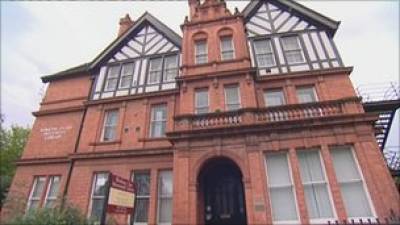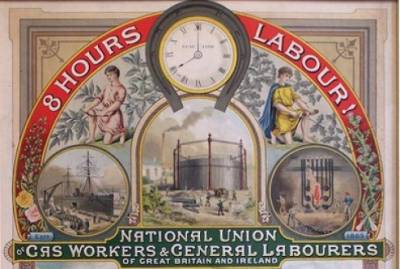Ernest Jones was born in Berlin on 25 January 1819 and died in Manchester on 26 January 1869, just fifty years old. He was brought up in the Black Forest area of Germany and lived there until he was nineteen years of age. His father, equerry to the Duke of Cumberland who was uncle to Queen Victoria, later served under Wellington.
He was a gifted child and at age ten he was writing poetry which was published in 1830 along with a transcription of Voltaire's Henriade. He attended the College of St. Michael, Lüneberg, an establishment only for the nobility, by invitation by 'letter patent' from the King. His democratic spirit first showed, when, at the age of eleven, he disappeared 'to help the Poles'. On leaving St. Michael's he gave a farewell address in German in front of nobility, which was later published, and received a certificate of honour, the highest ever recorded there.
His father returned to England in 1838 with his family and in 1841 Ernest was presented to Queen Victoria and became a regular court visitor. In 1841 he wrote a romance in two volumes called The Wood Spirit. Despite his first marriage in 1840 into an old Cumberland Conservative family and a promising career at the bar at Middle Temple he still had a passion for popular liberty and a devotion to literature and broke away to become the leader of the Chartists in 1845 in an honorary capacity. His private means allowed him to support financially the interests of the people and he forewent a legacy of two thousand pounds per annum rather than abandon the Chartist cause. He issued periodicals such as The Labourer, the Northern Star and Notes to the People in 1851 containing 'some of his best political and social writings' and established The People's Paper which he ran from 1852 to 1858, seeing its function as the maintenance of an independent working class party.

Ernest Jones is the Chartist candidate
Many of the Chartist meetings were dispersed and branded as seditious but Jones battled on with fervour. He urged the people to 'go on organising, organising, organising and the rest will come.... and you will see the green flag flying over Downing Street.' He was arrested on a charge of sedition after a lecture in Manchester's Campfield, sent for trial at Newgate on 10 July 1848 and sentenced to two years' solitary confinement, with no writing materials, in a thirteen foot by six foot cell. But with the help of friends he managed to write his epic poem The Revolt of Hindostan. He wrote to Chief Justice Wilde objecting to the conviction and accused the jury of being prejudiced through the press looking at him as a 'designing demagogue' to which he commented, 'I come from ranks far higher than any in that box and have sacrificed domestic comfort and pecuniary resources to the cause' for he never gained from the Chartist movement.
The Notes to the People contained serialised novels and articles in which the working man was invited to write in with grievances which he printed. For example a 'Practical Miner' wrote to him about the Colliers of South Staffordshire and 'The Butty System' which told about contractors demanding rises which the master could not turn down unless he closed the pit. Also 'air heading', if contracted for by the Butty, was done on the cheap or not at all, leaving the pit improperly ventilated. Jones also printed in each edition an address to the Chartists and news on the Co-operative Movement. He also included his poems and songs, one of the most famous being 'The Song of the Low' which echoes the feelings of the working class man of the times when he is 'not too low - the bread to grow, But too low the bread to eat' and the chorus:
We're low-we're low-we're very low,
As low as low can be;
The rich are high-for we make them so-
And a miserable lot are we!
And a miserable lot are we! Are we!
And a miserable lot are we!
Apart from poems Jones also wrote several novels including The Battle Day, The Painter of Florence, The Emperor's Vigil, Beldagon Church and Corayda.
With Chartism no longer a coherent movement, the People's Paper and the London News could not exist and after criticism from the Reynolds Weekly Newspaper he was forced to sell both. He launched the Cabinet Newspaper but it only lasted three months as an advocate of reform. After the extinction of Chartism and owing to pecuniary losses he returned as a barrister on the North Circuit and went on to gain distinctions showing the extent of his capabilities. But his political views never altered and he attained an unquestioned place in the public mood as a representative of the working-class man seeking a spokesman in Parliament.
The epitaph in the 'Memoir' was very fitting: 'He is no longer with us except in body, but his memory will not only ever be cherished by the working men of England but will live in the History of his Country, whose true and faithful son he was.'
Related Object of the Moment
May 2010: Ernest Jones commemorative jug
 A jug commemorating the life of Ernest Jones, lawyer, poet, journalist and one of the later leaders of the Chartists.
A jug commemorating the life of Ernest Jones, lawyer, poet, journalist and one of the later leaders of the Chartists.
Resources about Ernest Jones in the library collection
By Ernest Jones
Books
The battle-day: and other poems (1855) - Shelfmark: D19
Chartist songs and fugitive pieces - Shelfmark: D13
Chartist poems - Shelfmark: D15
Corayda: a tale of faith and chivalry, and other poems (1860) - Shelfmark: D19
Democracy vindicated: a lecture delivered to the Edinburgh Working Men's Institute, on the 4th January 1867 in reply to Professor Blackie's lecture on democracy, delivered on the previous evening (1867) - Shelfmark: D19
Ernest Jones: Chartist - selections from the writings and speeches of Ernest Jones with introduction and notes by John Saville (1952) - Shelfmark: B08
The hereditary landed aristocracy - Shelfmark: D18
Lectures: Canterbury versus Rome - Shelfmark: D54
The slaveholder's war (2007) - Shelfmark: D19
Pamphlets
Foreign affairs: an address delivered by Ernest Jones at Saint Martin's Hall, London, Tuesday, January 27, 1857 – Shelfmark: AG Chartism Box 2
Labour and capital: a lecture (1867) - Shelfmark: AG Radicalism Box 1
Our colonies: their climate, soil, produce, and emigrants – parts 1-3 (1857) - Shelfmark: AG Colonies Box 1
The politics of the day: a lecture delivered in Edinburgh, September 1868, under the auspices of the Edinburgh Reform League [ca. 1868] - Shelfmark: AG Parliamentary Reform Box 1
The right of public meeting: a letter addressed (before sentence) to Lord Chief Justice Sir Thomas Wilde [ca. 1848] – Shelfmark: AG Chartism Box 2
The state church: an address delivered by Ernest Jones, esq., at Saint Martin's Hall, London, Tuesday, November 25, 1856 – Shelfmark: AG Religion and Atheism Box 3
The trial for murder: Reg. v Levi Taylor - speech in defence of the prisoner [ca. 1863] - Shelfmark: AG Social Conditions Box 3
The unemployed: an address delivered by Ernest Jones at the Great Smithfield Meeting, Tuesday, February 17, 1857 - to which is added a reply to The Times and to minor opponents, and an insight into the prospects of emigrants in our colonies and the United States – Shelfmark: AG Chartism Box 2
About Ernest Jones
Books
Ernest Jones: who is he? what has he done? [ca. 1867] - Shelfmark: D19
In memoriam: Ernest Jones (1879) - Shelfmark: D54
In memoriam: an oration on the death of Ernest Jones, Esq. the people's friend delivered by FR Lees (1874) - Shelfmark: D19
The life of Ernest Jones by Frederick Leary (1887) - Shelfmark: D15
A short sketch of the life and labours of Ernest Jones, Chartist, barrister, and poet to which is added several of his poems by David P Davies (1897) - Shelfmark: D19
Pamphlets
Ernest Jones: the people's friend by AB Wakefield (1891) [in Social Revolution] - Shelfmark: J19/10
The representation of Manchester: who shall be its third member - a letter addressed to Sir Elkanah Armitage, Knight, Chairman of the Liberal Party by William Stokes [ca. 1868] [in Pamphlets] - Shelfmark: J25/2
Articles
Diary of Ernest Jones 1839-47 - In Our history ; Pamphlet 21 (Spring 1961), 20p - Shelfmark: A61
Ernest Jones - In The social-democrat: a monthly socialist review; Vol. 2 no.5 (May 1898), pp131-133 - Shelfmark: R11
Journal
The labourer: a monthly magazine of politics, literature, poetry, &c edited by Feargus O'Connor and Ernest Jones, Vols 1-4 (1847-1848) - Shelfmark: D43


